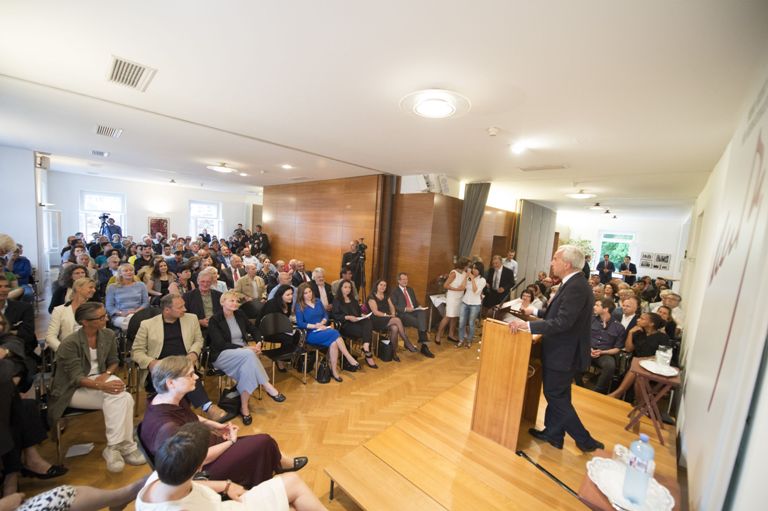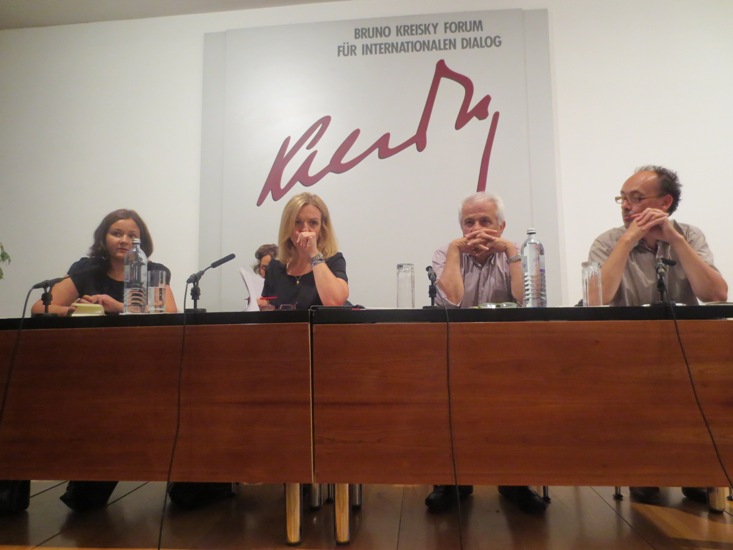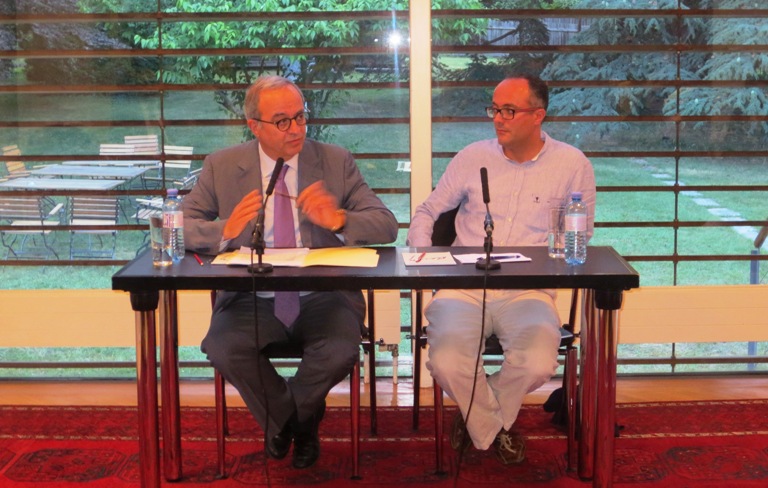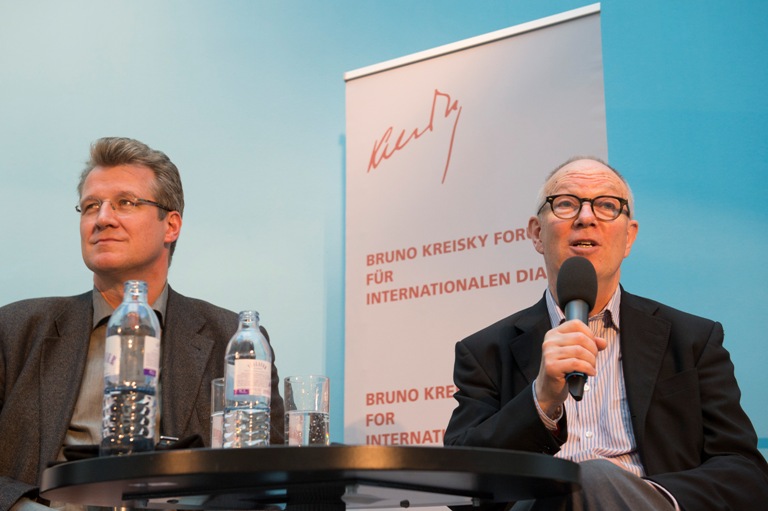BRUNO KREISKY PREIS FÃœR VERDIENSTE UM DIE MENSCHENRECHTE
Verleihung der 16. Bruno Kreisky Preise für Verdienste um die Menschenrechte
Verleihung der 16. Bruno Kreisky Preise für Verdienste um die Menschenrechte
Maria Eleni Koppa, Panteion University Athens
Monica Clua-Losada, Universitat Pompeu Fabra
Elena Papadopoulou, Scientific Advisor to Parliamentary Group SYRIZA
Robert Misik, Journalist and Author
What goal should the democratic left in Europe aim for? This question arises not only in the wake of the financial crash of 2008 and in light of the general austerity policy espoused in response among the ranks of the left, and not only classical economic concepts arouse controversy. In addition the issue as to what organizational forms are still in keeping with the present times is crucial.
New movements are emerging, and at the same time present a challenge to the traditional social democratic camp. Citizens often have the impression that all life has been drained from the parties representing the classical workers’ movement. However, modernization concepts have frequently had exactly the opposite effect of what had been hoped for, as they eroded the base of voters and followers.
In Greece, the social democratic forces have meanwhile been replaced by a new left-wing force, whilst in other countries New Leftist parties have emerged as rivals of the social democratic camp.
Maria Eleni Koppa is Assistant Professor at the Department of International, European and Area Studies of Panteion University and author of several articles on minority issues, democratization, nationalism and European politics, with a preference for comparative approaches. Koppa was a member of the S&D Group in the European Parliament from October 2007 until July 2014, focusing foreign policy.
Monica Clua-Losada is a lecturer at the Department of Political and Social Sciences at the Universitat Pompeu Fabra in Barcelona. Her research focuses on Critical Political Economy (CPE) and the role of subaltern groups. She has collaborated as an activist-researcher with different social movements, such as the Movement against Home Forclosures in Spain.
Elena Papadopoulou is an economist. She is Scientific Advisor to the SYRIZA Group in the Greek Parliament. Until 2012 she was researcher at the Nicos Poulantzas Institute and at the Department of Economics of the University of Athens.
Marwan Muasher 
is vice president for studies at the Carnegie Endowment, overseeing research in Washington and Beirut on the Middle East. He has served as Jordan’s ambassador to the United States, foreign minister, and deputy prime minister. He lives in Amman, Jordan.
Marwan Muashers book “The Second Arab Awakening” is not about immediate events or policies or responses to the Arab Spring. Instead, it takes a long, judicious view of political change in the Arab world, beginning with the first Awakening in the nineteenth century and extending into future decades when—if the dream is realized—a new Arab world defined by pluralism and tolerance will emerge. Marwan Muasher, former foreign minister of Jordan, asserts that all sides — the United States, Europe, Israel, and Arab governments alike — were deeply misguided in their thinking about Arab politics and society when the turmoil of the Arab Spring erupted. He explains the causes of the unrest, tracing them back to the first Arab Awakening, and warns of the forces today that threaten the success of the Second Arab Awakening, ignited in December 2010. Hope rests with the new generation and its commitment to tolerance, diversity, the peaceful rotation of power, and inclusive economic growth, Muasher maintains. He calls on the West to rethink political Islam and the Arab-Israeli conflict, and he discusses steps all parties can take to encourage positive state-building in the freshly unsettled Arab world.
Moderation: Bashir Bashir, Van Leer Institute, Jerusalem
Marwan Muasher: The Second Arab Awakening. And the Battle for Pluralism
2014, Yale University Press, ISBN: 9780300186390
Ian Buruma
1951 in Den Haag geboren, lehrt als Paul W. Williams Professor am Bard College und lebt in New York. Er veröffentlicht in zahlreichen amerikanischen und europäischen Zeitschriften. Bei Hanser erschienen zuletzt: Okzidentalismus. Der Westen in den Augen seiner Feinde (mit A. Margalit, 2005), Die Grenzen der Toleranz. Der Mord an Theo van Gogh (2007).
Das Ende des Zweiten Weltkriegs setzte die bis heute letzte globale Zäsur Ende und Anfang, die in unzählige einzelne Bilder und Geschichten zerfallen. Der niederländisch-amerikanische Historiker Ian Buruma hat Hunderte persönlicher Erinnerungen und Berichte aus Europa und Asien zu einer großen Geschichte der Welt zur Stunde Null zusammengefügt. Er erzählt von Feinden, die zu Befreiern wurden, blühenden Schwarzmärkten, Militärgerichten und Lynchjustiz, von Siegern und Besiegten, von Trauer, Angst und grenzenloser Freude. So anschaulich und vielstimmig war noch nie über den dramatischen Sommer 1945 zu lesen, in dem das Fundament für unsere Gegenwart gelegt wurde.
Nach dem Vortrag von Ian Buruma spricht Philipp Blom, Historiker, Journalist und Kurator der BKF-Veranstaltungsreihe Das Ende der Aufklärung mit dem Autor.
Das Buch Ian Burumas ’45. Die Welt am Wendepunkt (deutsche Übersetzung: Barbara Schaden) ist im Carl Hanser Verlag, München erschienen; 432 Seiten. Gebunden.
Die Veranstaltung findet in englischer Sprache im
WIEN MUSEUM, Karlsplatz 8, 1040 Wien
statt.